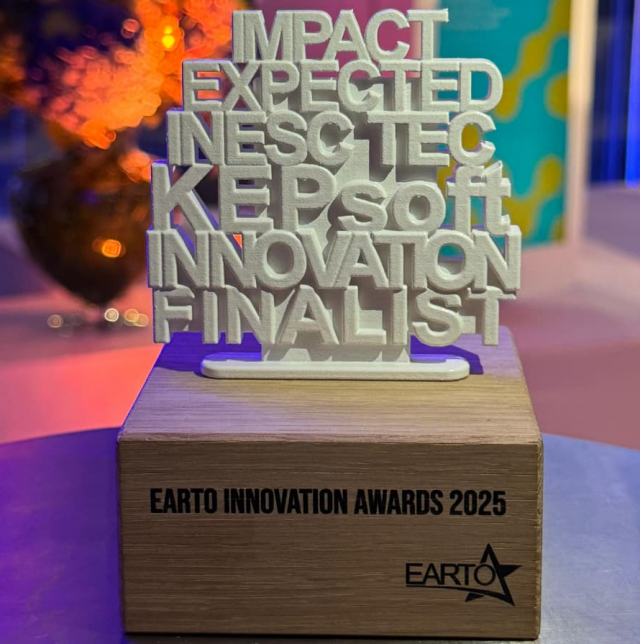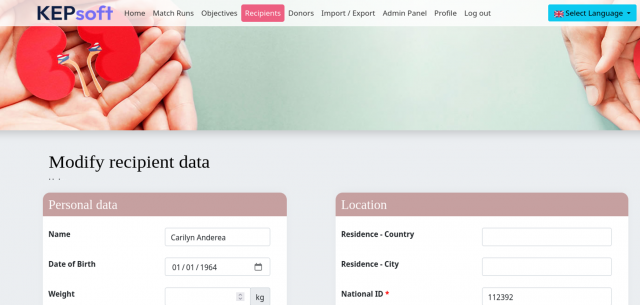European Innovation Award for Kidney Transplantation Software Developed with the Participation of a Momentum (Lendület) Research Group
With the support of the Hungarian Academy of Sciences’ Momentum Programme, Péter Biró, who founded his second Momentum research group in 2022, also participated in the development of a software tool called KEPsoft, which has won an Innovation Award from the European Association of Research and Technology Organisations (EARTO). The achievements of these dynamic researchers illustrate the wide-ranging innovation potential for those involved in social science research.
The four-member consortium representing Hungary’s ELTE KRTK Institute of Economics, founded with the support of the Hungarian Academy of Sciences, as well as Óbuda University, won third place in the EARTO (European Association of Research and Technology Organisations) Expected Impact Award for the development of the KEPsoft software. The software is being utilised by KEPsoft Collaborative, a non-profit company established in partnership with the University of Glasgow and INESC TEC Porto. The full news article can be read in English here.
The KEPsoft software provides assistance to kidney patients who have a relative who would like to donate a kidney to them through a living donor transplant, but for whom this is not possible for immunological reasons. These patients can register for the kidney exchange programme, where patients can exchange donors with each other in order to receive a high-quality, compatible kidney. The software performs quarterly matching in national and international programmes so that as many patients as possible can receive organs of sufficient quality. The first European kidney exchange programme was established in the Netherlands in 2004, and the largest programme operates in the United Kingdom, where more than 2,000 transplants have been performed since 2007.
The Mechanism Design Research Group, led by Péter Biró, was established in 2016 with the support of the Hungarian Academy of Sciences’ Momentum Programme, and in 2021, the group were once again awarded funding from the academic excellence programme. In addition, between 2017 and 2020, the Hungarian Academy of Sciences also provided significant funding to the research group as part of its Excellence Cooperation Programme. Researchers and programmers funded by these grants began developing simulator software as part of the European ENCKEP COST Action between 2016 and 2021. The simulator can be used to analyse the efficiency of kidney exchange programmes based on real and generated data, assuming different optimisation methods and international cooperation. Further development of this software was carried out under the KEPSOFT COST Innovators Grant in 2021–2022, with the aim of creating a comprehensive IT platform to support European applications with the resulting KEPsoft software.
To utilise the software, the four collaborating institutions established a non-profit company called the KEPsoft Collaborative in 2024, which can support the software in a self-sustaining manner from annual membership fees. Finally, in November 2024, the three-year project called EURO–KEP was launched as part of the EU4Health programme, in which Biró’s working group will continue to develop the KEPsoft software and simulator, which will provide the IT background for national and international programmes as well as the pan-European kidney exchange programme currently being organised.
 Source: INESC TEC
Source: INESC TEC The National Blood Supply Service, which coordinates the Hungarian kidney exchange programme, is also a member of the EURO–KEP project consortium. The domestic programme has been given new impetus by the law passed in August 2025 which significantly expands the opportunities for cooperation in the kidney exchange programme for the four domestic transplant centres (Budapest, Pécs, Debrecen, Szeged).
 Source: KEPSoft
Source: KEPSoft Momentum Mechanism Design Research Group
School selection, university admissions, subject selection, intern allocation, organ donor matching with patients – participant preferences are important in all of these applications, and central coordination can greatly contribute to achieving a fair and optimal outcome. The Momentum Mechanism Design Research Group has an interdisciplinary background and, in addition to the game-theoretical and algorithmic analysis of such issues, is also involved in the design and implementation of matching applications.
The Momentum Mechanism Design Research Group operates at the Institute of Economics of the ELTE Research Centre for Economics and Regional Studies. Their results illustrate the wide-ranging innovation opportunities available to social science researchers. KEPsoft, developed with the participation of the research group, is the first pan-European software platform that uses optimisation algorithms to help identify the best possible donor pairs for kidney transplants. The system aims to increase the efficiency of kidney exchange programmes and reduce patient waiting times, thereby improving the quality of life of transplant patients.
What makes KEPsoft unique is that it offers a more comprehensive, continuously updated solution compared to existing national systems. With its help, the number of living donor kidney transplants can be increased, and the logistics of surgeries can be planned more safely. The introduction of this development could result in savings of up to €2 million for every hundred patients in the healthcare system, while enabling more people to switch from dialysis to life-saving transplants.
